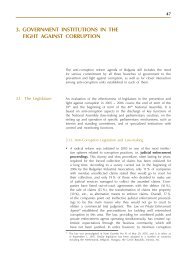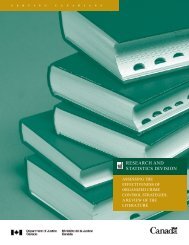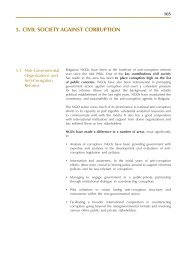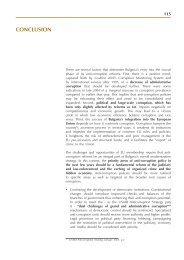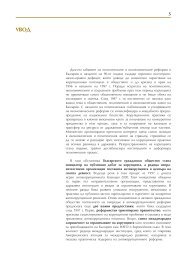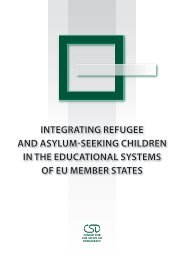National Threat Assessment 2008. Organised Crime - Politie
National Threat Assessment 2008. Organised Crime - Politie
National Threat Assessment 2008. Organised Crime - Politie
You also want an ePaper? Increase the reach of your titles
YUMPU automatically turns print PDFs into web optimized ePapers that Google loves.
have created more opportunities within business activities. Information can be<br />
distributed at lightning speed on an unprecedented scale. However, apart from<br />
legitimate uses, such distribution speeds also facilitate current criminal activities<br />
and make new types of criminal misuse possible.<br />
Finally, the differences in tax rates within the EU are also an important factor,<br />
because as long as those differences exist, fraud will remain an attractive<br />
possibility to earn large sums of money.<br />
Expectations<br />
One important characteristic of public purse fraud is that performance details<br />
can be adjusted easily to changing circumstances. Between the 1980s and now,<br />
for example, this fraud construction has been used for several types of fraud,<br />
despite various measures to prevent its use. The results of this research provide<br />
no reason to assume that the use of this fraud construction will decline in the<br />
coming years. The opposite is more likely. The construction can be set up in an<br />
increasingly complex manner, as more and more legal entities in more and more<br />
countries become involved. As a result, the true nature of the various transactions<br />
can be effectively concealed. This makes investigation and prosecution difficult<br />
and, as a result, time-consuming and expensive, and partly dependent on chance.<br />
The quality of the collaboration and information exchanged between different<br />
countries, on which investigations are dependent, varies.<br />
In the Netherlands the duty on alcohol, cigarettes and tobacco was increased<br />
considerably in <strong>2008.</strong> In 2009 this will be followed by the VAT on luxury goods<br />
with an increase from 19% to 20%. These measures increase the price wedge,<br />
thus making fraud more attractive, and the scale of fraud is therefore expected<br />
to increase rather than decrease.<br />
A number of developments are expected to encourage fraud. The roles of<br />
Customs and the tax authorities are central in this regard. Due to the free<br />
movement of goods within the European Union, there are no longer inspections<br />
at the internal borders, as a result of which Customs now perform fewer<br />
physical inspections. Customs is in the process of closing down various units<br />
that used to perform physical inspections. A shift is underway towards more<br />
administrative monitoring. In part due to technological developments, the<br />
authorities can easily check whether everything registered in advance actually<br />
reaches its destination. The basic principle of self-regulation is also used more<br />
and more often. Requests for permits submitted by transport and forwarding<br />
companies are nowadays checked less frequently. Furthermore, the inspections<br />
are increasingly being taken over by the tax authorities. In the short term this<br />
104 <strong>National</strong> <strong>Threat</strong> <strong>Assessment</strong> 2008 – <strong>Organised</strong> crime



